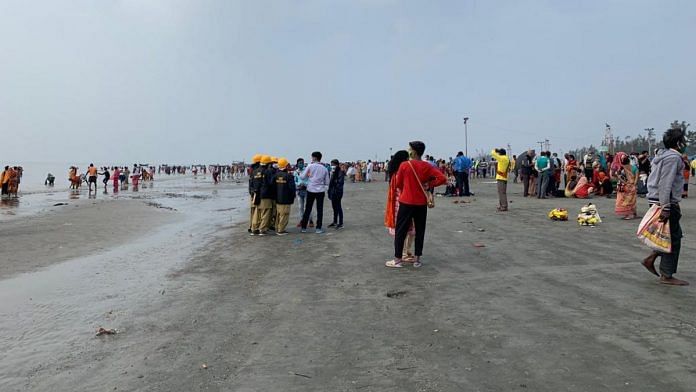New Delhi: The West Bengal government told the Calcutta High Court last week that the chances of droplet transmission (infection transmitted through speaking, coughing etc) are less in salt water, and this is one of the reasons why it is not in favour of the 10-day Ganga Sagar Mela being cancelled. This is the second time, after 2021, that the state government is making such a claim.
The court had asked the state government to respond to a plea to cancel the mela. There is a surge of Covid-19 cases currently sweeping through West Bengal. The state recorded 22,645 Covid cases Friday, taking the active case tally over 1.45 lakh. The positivity rate was 31.14 per cent as of Friday.
“Regarding the possibility of spread of virus on account of oral droplets and nasal droplets in river water and their population and transmission through the water when the infected pilgrims will take holy dip, a report in the form of an affidavit filed by the director of health services, health and family welfare department, of this government last year on the same issue in WPA (P) 23 of 2020 in Ajay Kumar Dey versus the state of West Bengal and others, states that ‘the risk of Covid-19 transmission through bathing in flowing water like a river or saline water in a sea is extremely low’,” the state government wrote in an affidavit dated 6 January.
The report in question is attached as an annexure in the current affidavit. It listed out the screening and other medical facilities that have been put in place for the religious gathering.
In the document, Director of Health Services Dr Ajoy Kumar Chakraborty stated: “Pursuant to the said direction of the honourable division bench of the honourable court dated 13 January 2021, I beg to state that the risk of Covid-19 transmission through bathing in flowing water like a river or saline water in a sea is extremely low. However, as a measure of abundant precaution, pilgrims are allowed to go for a dip in a staggered manner, maintaining a safe distance between one another. Foot marking for maintaining social distance has been done at the beach and also at the temple bus bays and stations.”
ThePrint reached Chakraborty for his comments over the phone and through WhatsApp and text messages, but received no response till the time of publication.
The mela is currently underway in South 24 Parganas district’s Sagar — the confluence of the Hooghly and the Bay of Bengal. About 4-5 lakh pilgrims are expected to attend it and Friday, being Makar Sankranti, is believed to have been one of the holiest days to take a dip in the water.
It is comparable to the crowds at the Kumbh Mela in Haridwar amid the devastating second wave of Covid last year, which is believed to have further fuelled the surge.
Also read: Strictly follow COVID-19 norms: Mamata to Gangasagar pilgrims
‘Factors like humidity, salinity have no role’
A virologist, who did not want to be quoted, told ThePrint that “factors like humidity, wind speed or salinity have no role in the transmission of the virus”.
“It will happen as long as there is a packing of people, they are standing in close proximity, without masks. In fact, the advice now is to wear multiple or layered masks to trap a layer of air in between to prevent transmission,” the virologist added.
There is no basis either about salt water being any different with respect to the survival of the SARS-CoV-2 virus.
In October 2021, a paper published in Nature that looked at “the effectiveness of various gargle formulations and salt water against SARS-CoV-2” came to the conclusion that salt water is not effective against the virus.
While the US CDC (Centers for Disease Control and Prevention) guidelines do say that there is no evidence of Covid-19 spreading to people through the water in pools, hot tubs, spas, or water play areas, swimming pools in India have stayed closed for the larger part of the last two years.
However, river water into which sewage often flows is a different matter. The Council of Scientific and Industrial Research (CSIR) has developed a system of wastewater surveillance to track the spread of the SARS-CoV-2 virus. Scientists also found traces of the virus in Pune’s waste water.
In a paper published last year in the journal Environmental Science: Water Research & Technology, US researchers wrote: “During the current pandemic large sewage spills, flooding dwellings and community spaces, have occurred in the United States (Georgia, Florida, and New York) and Spain (Andalucia), while temporary settlements (e.g., shanty towns, favelas, or bustees) and refugee camps are less likely to have safe sanitation systems.
“In these settings, this water system pathway could enable transmission of the virus to humans or other susceptible animals via water ingestion, aerosol generation, or filtering of water during feeding. It is also clear that conventional wastewater treatment methods only partially remove SARS-CoVs, highlighting the need for wastewater risk assessments and methods tailored to SARS-CoV-2.”
(Edited by Saikat Niyogi)
Also read: Masks & distancing don’t matter at Ganga Sagar mela, but ‘1 Covid case’ found in 3 lakh pilgrims



